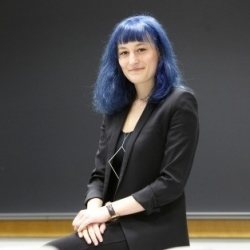 Before Perrine Marcenac even enrolled at Harvard School of Public Health, the institution changed her life.
Before Perrine Marcenac even enrolled at Harvard School of Public Health, the institution changed her life.
During an interview for the PhD Program in Biological Sciences in Public Health, Marcenac found herself fascinated by her faculty interviewers’ work on the malaria vector and parasite, and by the time she said good-bye, she’d found her research calling.
“I remember thinking ‘Wow! That’s really interesting,’” recalls Marcenac, now a second-year doctoral student. “During these 30-minute conversations with them, I just instantly knew. They asked me the right questions. They challenged me. I could see their passion. I don’t think picking up a paper and reading it could have given me nearly the same desire to work in the field.”
That desire has stayed with her. These days, the 27-year-old Marcenac is absorbed in research on mosquito biology and how malaria spreads. In particular, she is exploring the interplay between reproduction and immunity in Anopheles gambiae, the primary mosquito vector responsible for the transmission of malaria in most of sub-Saharan Africa. Highlights of her work to date include field research in the West African nation of Burkina Faso, which she describes as incredibly demanding but also exhilarating.
“It’s really critical to test in the field with natural populations of mosquitos—to see if our results are the same there as they are in the lab,” she explains. “It was a month of the hardest work I’ve ever done, but it was so awesome. I was very lucky to get into the field my first year, and I hope to go back.”
As a PhD student, Marcenac is hosted by Harvard’s Graduate School of Arts and Sciences, but her work is primarily carried out through Harvard School of Public Health, where she conducts research in the Department of Immunology and Infectious Diseases. The opportunity to do scientific research within a school of public health is tremendously valuable, she says.
“Because I’m interested in answering questions relevant to international health, it’s important to have people working in that context here at the population level. It’s exciting to think about the possibility of collaborating with epidemiologists and biostatisticians as well as other laboratory scientists.”
As the child of two globe-trotting chemical engineers, Marcenac developed her international perspective early on. Before attending Boston University, she had lived in France, Michigan, Singapore, and Indiana and had traveled extensively through some of the world’s poorest regions. Those experiences ultimately led to an undergraduate internship with Doctors Without Borders and continue to fuel her commitment to global health. “I saw a lot of injustice relating to health access, and it’s something that I’ve carried with me,” she says.
Another enduring legacy of Marcenac’s childhood is her conviction that gender should have no bearing on her research career. In an era when the shortage of women in STEM (science, technology, engineering, and math) professions, including academia and research, continues to spark concern, Marcenac feels fortunate that her scientific pursuits took root in fertile soil. “My parents were both scientists. To me there was never a difference between my dad’s ability and my mom’s ability. I was lucky to be raised in an environment where no one ever suggested that girls weren’t good at science.”
In her advisor, Flaminia Catteruccia, Marcenac now has both a role model and source of guidance and support. “Perhaps a female scientist at her level understands the roadblocks that someone in my position might encounter along the way,” Marcenac says. “She has definitely pushed me to do things I might not have done—like giving a talk at a conference. Her awareness helps me move forward. It’s really good.”
photo: Kent Dayton



